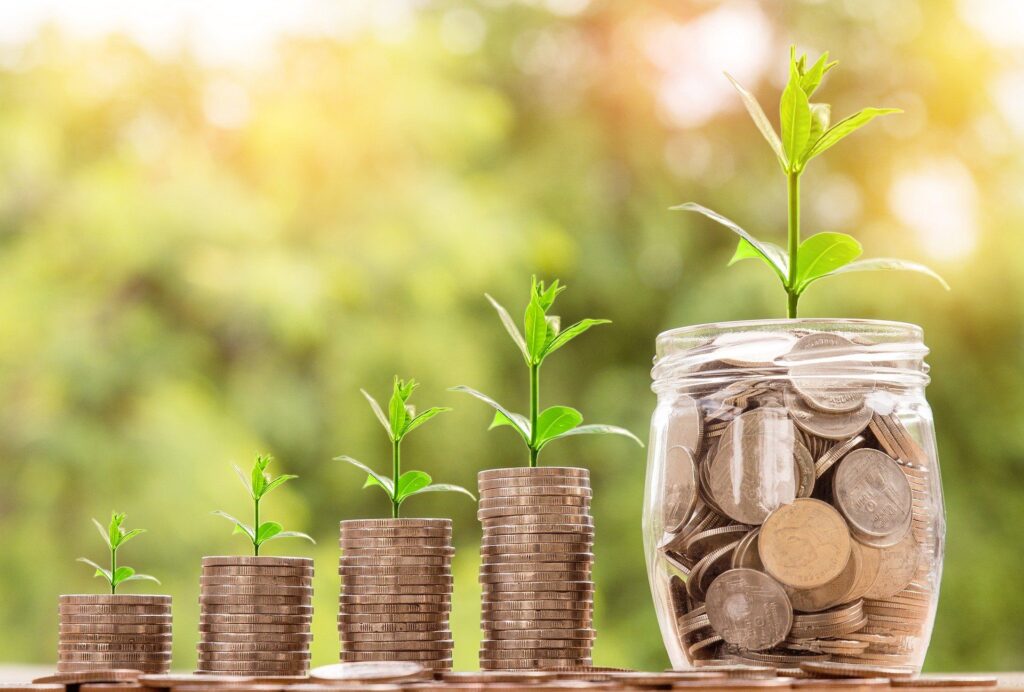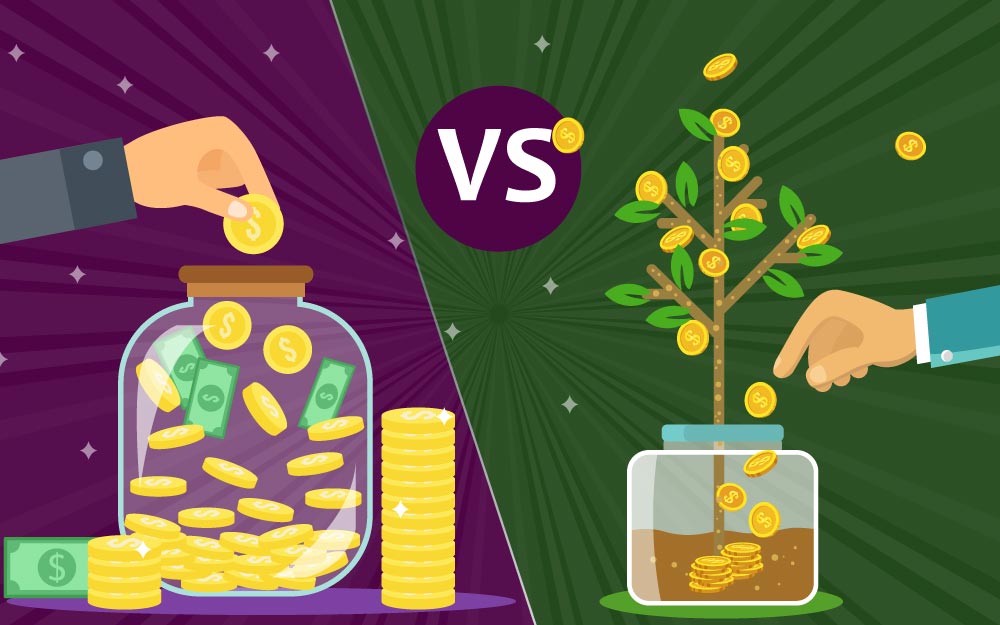They go together like peanut butter and jelly, like cold medicine and a cup of coffee, and like… well, we all know that seemingly similar activities have some important differences that can be hard to see at first glance. So let’s look at the similarities. Both saving and investing are investments, since both involve the sale of an asset with the intention of purchasing another one with the proceeds. True, but that’s where the similarities end.
The “Saving vs. Investing” article (above) is about the similarities in the two strategies but didn’t mention which one had the better overall returns. In this article (below), we’ll look at the numbers and see which one earns larger profits over the long term (savings vs. investments, competitive interest rates, risk, etc.).
If you are just starting out in personal finance, you may be confused about how to best make investments for your future. You may have heard that compound interest is the most powerful force in the world. It is true that even small amounts of money can grow to a large amount over time. But what if you want to save compound interest instead of investing? Many people think savings are better than investments because you usually get a higher return on your money. However, is it really true that you get more money back on your deposits than you get in interest?
Managing your personal finances is one of the most important aspects of your life, and you should always be aware of how much you currently have saved. What’s the reason? Because you easily overspend or even underspend, or because you save so much that you don’t have time to enjoy the money you save.
To avoid falling from one extreme to another, it’s best to develop a financial strategy that fits your lifestyle and income. Because it is a difficult subject, many people avoid talking about it or it quickly leads to family quarrels. It’s a personal matter.
You have to deal with what society calls success. Today we cover everything you need to know about investing as part of your savings strategy (investing for the future, goals, etc.) and about saving as a logical step after investing.
Ultimately, these are two different but complementary things. This is the key to improving your financial situation.
1. Monetary identity

Your relationship with money and how you handle it can fall into one of five categories. You can spend, save, buy or go into debt a lot. The book How to worry less about money by John Armstrong is a quick read that can help you gain insight into your upbringing in relation to money and the personality you have created.
The book explains your financial relationships and how to balance what you got from your parents as a child or what you never had but everyone else did.
It doesn’t have to be material satisfaction; it can also take the form of overdoing it to compensate for dissatisfaction with your current life, or pretending you’ll be happy when you’re rich.
We’re not saying money can’t make you happy, but do you need millions, or is your marriage falling apart because you’re not communicating enough with your partner? You can create your strategy and make the money work for you if you are honest with yourself.
2. Investing is the same as saving

Investing in stocks has become increasingly popular over the years, especially during the epidemic. Look at an investment in shares in the same way as an investment in an apartment that you want to rent out later.
You receive money every month for rent, but you don’t have to buy a new apartment every month, so this income is called passive income. Fortunately, investing has never been easier than it is today, thanks to technological advances. We recommend that you do an internship in your chosen field.
Maybe you want to invest in Tesla, or maybe you’re more interested in oil. Despite the drop in consumption, oil remains the main asset on the market, and with a bet like this, you can rarely go wrong. Therefore, experts urge you to start learning after you open a trading account and get help from your Forex broker.
You will learn how much patience, analysis and understanding of the global economy are needed to make stock market investing your second source of income.
It is always useful and necessary. It is very important to start carefully, not to get carried away, but to understand that you have to learn and that you cannot go wrong, even with small investments. Get informed, find creative solutions and good luck!You may have heard the phrase “Saving is Investing.” That’s true, but it’s not the whole truth. You can save and invest, but they’re very different things.. Read more about savings vs investment ratio and let us know what you think.
Frequently Asked Questions
What are the similarities between saving and investing?

A savings account and an investment account are both simple ways to keep a small amount of money in a financial institution. Both are designed to prevent unplanned spending from occurring, and are intended to be temporary. That’s the key difference. The main goal of saving is to accumulate cash so that you can use it when you need it: as a buffer to prevent you from running out of money at the worst possible moment. The main goal of investing, on the other hand, is to increase the value of your money.
Depending on the type of investment, you can see the money grow over time, or have it increase in value by a specific percentage. While savings and investing do have some important similarities, they are also distinct enough to warrant There are many similarities between saving and investing. Both are long-term endeavors that hold their value and retain their purchasing power over time. Both are based on the idea that money grows from compound interest, and both can have tax consequences. And both have the tendency to attract detractors who claim the other is the “wrong” path. In this article, we’ll help you sort out what’s right for you.
Why is saving better than investing?

Saving is one of the oldest financial philosophies you can adopt. It’s the philosophy of putting money aside to have something to fall back on in the event of an emergency or financial setback. On the other hand, investing is the philosophy of taking money that is not in a savings account and investing it in the market either through your own hard work, or through the help of a financial professional.
When it comes to saving versus investing, more and more people are recognizing the similarities between the two. As the economy improves, the question of whether to save or invest is becoming more relevant to more people. If you want to be financially independent, it’s not a bad idea to consider both options, to know which one will produce the most positive outcome for your financial future.
Is saving and investing the same thing?
Borrowing an idea from finance, there are two types of saving: saving and investing. Both are important, but it’s easy to overlook the differences between them. For example, you may have heard that saving is more important than investing, but is saving really the same as investing? People are often confused about the difference between saving and investing. Saving is the process of putting money away for a rainy day or to use later. As explained by business expert and virtual CIO from Innovation Vista, investing is the process of putting money in the market for the purpose of making money. When it’s all said and done, it seems that there isn’t much difference between the two.







